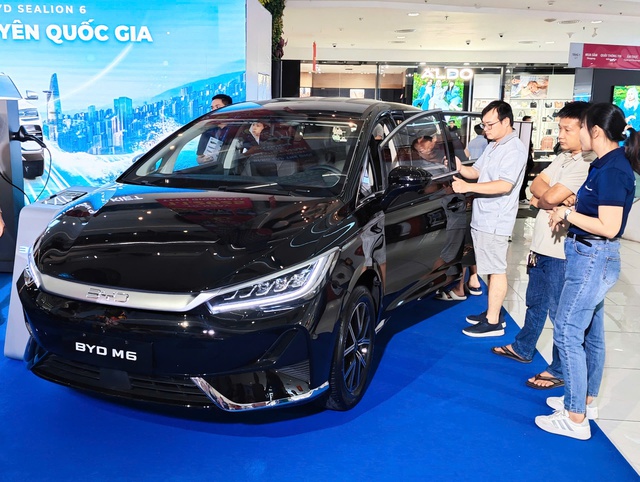
Visitors look at a BYD M6 electric vehicle on display at a shopping mall in Ho Chi Minh City, Vietnam. Photo: Cong Trung / Tuoi Tre
Under a program launched on May 19 and running through August 19, Grab and BYD Vietnam are offering promotions to encourage drivers to switch from fuel-powered vehicles to EVs.
Perks include a guaranteed income of up to VND25 million (US$961) per month for GrabCar Plus drivers, and an eight-year or 500,000-kilometer battery warranty.
The initiative highlights the BYD M6 — an electric MPV with an estimated on-road price of around VND750 million ($28,845) — as a recommended model for Grab drivers.
The companies say the partnership is aimed at modernizing ride-hailing with quieter, more environmentally friendly vehicles, in line with growing consumer demand for premium and sustainable transport.
“This collaboration seeks to redefine ride-hailing through advanced technology and luxury comfort,” said Ouyang Xiaocheng, CEO of BYD Vietnam.
Driver doubts despite incentives
Despite the incentives, some Grab drivers remain cautious.
Many question whether the promised monthly income will remain after the promotion period, especially as the number of EV drivers increases.
“The market is full of competitors,” said one driver in Ho Chi Minh City.
“Sometimes we wait 30 minutes to an hour without a ride because there are too many drivers already.”
Some drivers worry that investing in an EV without a reliable stream of customers — or charging stations — could leave them at a loss.
While BYD has opened dealerships and promoted its vehicles in Vietnam, its charging infrastructure remains limited, especially compared to local competitor VinFast.
“I don’t care how nice the car is — if I have to waste time searching for a charging station and miss rides, it’s not worth it,” said Minh, a GrabCar driver.
“Show us the charging network first, then we’ll consider switching.”
Currently, Vietnam’s public EV charging network is dominated by VinFast, which primarily serves its own fleet.
Drivers of BYD and other non-VinFast EVs often struggle to find compatible charging options, leading to hesitation among those considering a switch.
Vietnam’s EV market heats up
According to market intelligence and advisory firm Mordor Intelligence, Xanh SM — a VinFast-affiliated ride-hailing service — captured 39.85 percent of Vietnam’s ride-hailing and taxi market in the first quarter of 2025, surpassing Grab’s 35.57 percent.
In the EV segment, Xanh SM holds a clear lead, supported by VinFast’s wide-reaching charging ecosystem.
Meanwhile, Be Group recently ended its partnership with Xanh SM, citing a shift in strategy.
The company said it would continue its EV transition by collaborating with other automakers, expanding driver incentives, and diversifying vehicle sourcing.
VinFast has also introduced four new EV models tailored for transportation services: the Minio Green mini car, the Limo Green seven-seat multi-purpose vehicle, the Herio Green A-segment sport utility vehicle, and the Nerio Green C-segment sport utility vehicle — targeting the same ride-hailing market as BYD’s M6.
The launch increases competitive pressure on Grab, which currently lacks a proprietary EV ecosystem.
While Grab’s partnership with BYD may help modernize its fleet, the lack of independent charging infrastructure remains a major hurdle for driver adoption.


Max: 1500 characters
There are no comments yet. Be the first to comment.